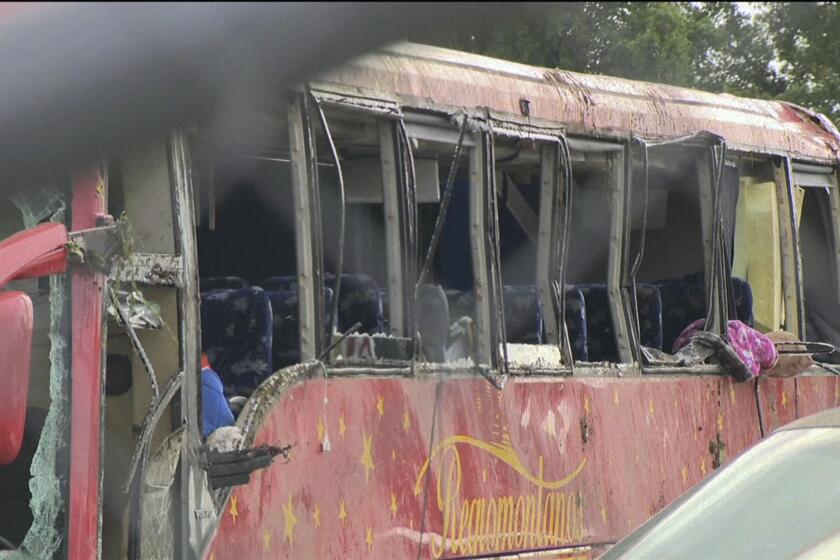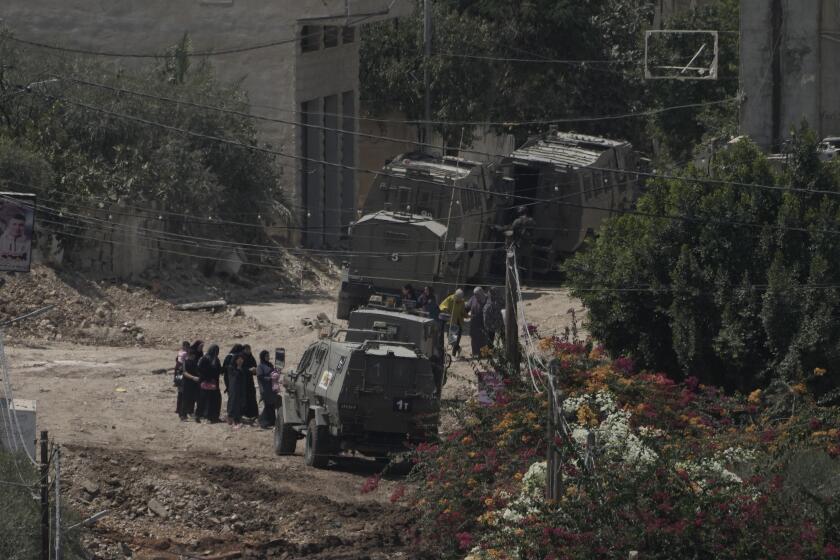Protests in China over local grievances surge, and get a hearing
In a country with zero tolerance for public displays of disaffection, the 77-year-old retired doctor went very public with her anger over the demolition of her property in a booming Shanghai neighborhood: She stripped naked on the steps of a courthouse.
This might well be called the season of discontent in China. People, many of them middle-class homeowners, have been taking to the streets across the country in the last few months to air their grievances. At times, the protesters have turned violent — overturning police cars or smashing windows with baseball bats — but more often, they are engaging in civil disobedience.
Unlike 1989, when calls for democracy ended in carnage at Tiananmen Square, today’s demonstrations lack an overarching political theme. Protesters for the most part are not demanding radical changes in the status quo of one-party rule.
In fact, anonymous calls over the Internet for pro-democracy demonstrations in sympathy with Egypt and Tunisia received little public support and were quickly stamped out by the government. But single-issue protests are raging throughout China.
These demonstrators have a narrow agenda and concrete demands: Farmers want a stop to confiscations of their land or to get better compensation for lost property. Homeowners want to stop demolitions. People want cleaner air and water and safer food. Truckers and taxi drivers want relief from soaring fuel prices.
The increased number of protests does not necessarily reflect fragility in the system as much as a pragmatic approach by the Communist Party to grievances, said Ding Xueliang, a professor of sociology at the Hong Kong University of Science and Technology.
“If there is no channel for people to express their anger, they will come to the conclusion that it is the political system that is repressing them,” Ding said. “You need to leave some room for collective action. You can’t just open fire every time people come out on the streets.”
The protests have been localized, with virtually no coordination between them, one reason the government has been relatively tolerant. But the risks for Beijing are not insignificant: There is a danger that people will be inspired by example, because the issues are the same throughout China, and that the “micro-protests” will coalesce into something bigger.
The number of reported “mass incidents” rose from 8,700 in 1993 to more than 90,000 in 2006, according to the Chinese Police Academy. A professor at Tsinghua University, Sun Liping, has told Chinese reporters he believes the figure last year was up to 180,000.
To some extent, the exponential increase is because of improved reporting of incidents that once would have been buried by the state press. Nowadays, the minute a window is smashed, somebody will whip out a cellphone camera and shoot a video that quickly is posted on a blog. The surge also reflects a public that is better informed and more active in seeking redress for grievances.
“People are getting braver,” said Liu Baojun, 45, a farmer who was among protesters who lay down in a cornfield in front of tractors that were clearing the land for a highway in northeastern China in May. “In the past, whatever the government told us, we believed and we would do what they said. Now we have information. We have books.”
Many of the new protesters are homeowners or middle-class professionals. Doctors at Tongren Hospital in Beijing staged a one-hour strike in mid-September to demand better security after one of their colleagues was stabbed and critically injured by a patient.
At a demonstration in the northeastern seaport of Dalian to demand the closing of a chemical plant that allegedly was spilling toxic substances into the sea, most of the 20,000 protesters were middle-class homeowners concerned about their property values and their children’s health, much like the not-in-my-backyard protests so familiar in the United States.
Not only did police exercise restraint, some offered directions to protesters on how to reach the demonstration. Municipal authorities quickly responded to the pressure, announcing within days the closure of the offending factory, which produced paraxylene, a highly toxic ingredient in the production of polyester.
“It will be written into the history books,” Qian Wenzhong, a history professor at Shanghai’s Fudan University, crowed on his blog the day the closure was announced. “From today on, the rulers will understand that they can never neglect people’s will anymore.”
In China, it is impossible to go to court to get a temporary restraining order if, for example, a factory is spewing harmful sustances into the water supply or somebody starts building on your land. Petitioning, an archaic practice dating to imperial times, requires the aggrieved to travel to Beijing and wait for months, if not years.
Rioting gets results. Quickly.
“It wasn’t until a police car was overturned that the government started to pay attention,” said Li Jun, 22, an environmental activist in Haining in the eastern province of Zhejiang, where villagers last month stormed the gates of a solar-panel factory, smashing windows and vandalizing cars.
For months, villagers had been complaining that the plant’s discharge was killing fish in the river and raising cancer rates. After four days of rioting, authorities closed the plant and the operator issued a formal apology.
In Anshun, a small city in the southern province of Guizhou, the death of a disabled fruit vendor in the custody of the chengguan, neighborhood police widely disliked throughout China for their brutality, brought thousands of infuriated people out into the streets hurling stones and overturning cars in July. Within days, authorities sacked the officers involved.
Residents of a Guangdong province fishing village called Wukan who watched luxury villas crop up on what had been their land ransacked municipal offices and a restaurant and ranch belonging to a wealthy Hong Kong real estate developer in late September. As a result, authorities agreed to an investigation of all land deals in the southern village going back to 1978.
Last month, residents in a neighboring village, inspired by example, began a similar protest.
“We have a huge gap between rich and poor in our village. We want to see what role land sales play in that,” said Zhang Chenhao, 22, who calls himself one of a group of “patriotic youths” in Wukan.
Property confiscation is probably the largest single trigger for extreme protest. A 79-year-old man immolated himself last year to protest an eviction; in May, a farmer set bombs in three government buildings, killing himself and two others.
The woman who stripped at the Shanghai courthouse, Zhuang Jinghui, complained that her home and clinic were demolished in 2008 for redevelopment and that she was tricked out of the compensation she was promised. The extreme protest was effective: The judge and prosecutor handling her case sat down for a meeting and promised to get the case solved by the end of the year.
The land issue looms large in the countryside. Local governments last year earned $470 billion from land deals, up from $70 million in 1989, according to the Ministry of Land and Resources, and farmers — who lease their land rather than own it under the communist system — have scant protection if local officials want to give the leases to real estate developers who will pay more. Compensation is often inadequate.
Chinese laws designed to protect farmland by requiring permission from the State Council — in effect, the country’s Cabinet — for transfers are widely ignored by local officials.
Ma Jinhua, a 43-year-old resident of Siping, in the northeastern province of Jilin, said she was sowing corn seeds on fields her husband’s family had farmed for generations when local officials, accompanied by uniformed police, ordered her off the land.
In the two years since, villagers have managed to stave off the building of a pharmaceutical factory by confronting engineering crews and, in July, sabotaging surveyors’ equipment.
“We usually send the women and old people out. We figure they won’t hurt us. The local government has hired thugs with sticks and clubs. If the young men go out, it will turn violent,” said Ma, who was in Beijing recently with other villagers trying to get a hearing at the petition office
So far they haven’t dared to throw rocks or overturn cars.
“If we did anything like that, they’d kill us,” said Xie Yajun, a 53-year-old neighbor. “But we are reading law books. We are getting ourselves prepared.”
More to Read
Sign up for Essential California
The most important California stories and recommendations in your inbox every morning.
You may occasionally receive promotional content from the Los Angeles Times.






